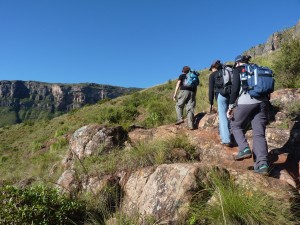As one of the world’s leading initiatives to engage with, and promote positive accomplishments amongst the world’s youth population, the Duke of Edinburgh’s Award has continued to inspire and help young  people achieve their potential throughout the world. In no other region has this been more apparent than in the continent of Africa.
people achieve their potential throughout the world. In no other region has this been more apparent than in the continent of Africa.
The Duke of Edinburgh’s Award empowers those between 14 and 25 years old to be active, enthusiastic contributors to the world around them. In Africa this has culminated in a variety of initiatives and projects set up across many different countries in that region. Those who run the awards hope that through engaging with young people in numerous places, that the biggest possible positive impact can be made. The success of the organisation can be seen through a range of impressive statistics which show that each year 300,000 people take part in the Duke of Edinburgh’s Award, many of whom come from difficult or underprivileged backgrounds.
The Duke of Edinburgh’s Award has a team operating in Africa which has had a significant number of successes. This team coordinates with projects across the African continent ensuring that an increasing number of young people in that part of the world have access to the life affirming, confidence building, and fun activities which are offered by the Duke of Edinburgh’s Award. Edwin Kimani and Martin Matabishi, in their capacities as the Africa Regional Director and Africa Regional Programme Manager respectively, work with 21 national operators across the continent as well as a further 20 independent Duke of Edinburgh’s Award centres.
Initiatives carried out in Africa have included engaging with communities in Ghana through a charity called Village by Village. Through volunteering with this organisation, individuals under 25 can add this achievement to their Duke of Edinburgh’s Award. Volunteers contribute their time to help teach English to children of West African communities in Ghana, assist construction workers to complete the important amenities and buildings required for the region to prosper, coach children in a variety of sports, assist professionals in providing health care and health clinics, offer business advice to developing businesses, or capture the spirit of Africa in photographs which will go on to promote the cause.
Initiatives such as Village by Village show the impact that the Duke of Edinburgh’s Award has on an international level, providing both, philanthropic services, as well as helping young people develop into well rounded and conscientious adults.
Operating since 1956, the Duke of Edinburgh’s Award offers a World Fellowship initiative where successful business people and philanthropists such as Tunde Folawiyo (for more information please visit this Tunde Folawiyo bio) continue to contribute their time and resources to helping the Duke of Edinburgh’s Award change the lives of as many young people as possible, for the better.

![By Evilbish (Own work) [CC-BY-3.0 (http://creativecommons.org/licenses/by/3.0)], via Wikimedia Commons Tunde Folawiyo](http://upload.wikimedia.org/wikipedia/commons/f/f0/Mam_Tor.jpg) The themed event will take place on the 20th to the 21st of September in the UK’s Peak District. Teams comprised of four to six participants will be subject to a £2,250 upon registration. The number of teams may range from 20-25, demonstrating the great popularity of the annual event. Teams will camp out overnight, hiking more than 30 miles spanning a two-day period. During this time, they’ll tackle a variety of activities like archery, abseiling and rafting.
The themed event will take place on the 20th to the 21st of September in the UK’s Peak District. Teams comprised of four to six participants will be subject to a £2,250 upon registration. The number of teams may range from 20-25, demonstrating the great popularity of the annual event. Teams will camp out overnight, hiking more than 30 miles spanning a two-day period. During this time, they’ll tackle a variety of activities like archery, abseiling and rafting. For Christian Owen, a young deaf student, the lack of understanding regarding BSL (British Sign Language) was his biggest source of frustration. He decided to use his involvement in the DofE to do something about this; he wanted to make this language more accessible to the general public, and so chose to produce the world’s first ever manual for BSL.
For Christian Owen, a young deaf student, the lack of understanding regarding BSL (British Sign Language) was his biggest source of frustration. He decided to use his involvement in the DofE to do something about this; he wanted to make this language more accessible to the general public, and so chose to produce the world’s first ever manual for BSL. The organisation was first spearheaded by HRH The Duke of Edinburgh as a programme for boys. Consisting of four segments – rescue, expeditions, public service and fitness – the programme sought to provide a stable environment for young boys to acquire vital life skills to aid in their progression toward adulthood. By 1957, over 7,000 boys had begun DofE programmes, with one thousand Awards achieved since its establishment. One year later, the DofE for Girls is established, focusing on the areas of living, interests, adventures and services. The programme’s first Gold Award was presented at the famed Buckingham Palace. During this same year, pilot projects were initiated in eleven other Commonwealth nations.
The organisation was first spearheaded by HRH The Duke of Edinburgh as a programme for boys. Consisting of four segments – rescue, expeditions, public service and fitness – the programme sought to provide a stable environment for young boys to acquire vital life skills to aid in their progression toward adulthood. By 1957, over 7,000 boys had begun DofE programmes, with one thousand Awards achieved since its establishment. One year later, the DofE for Girls is established, focusing on the areas of living, interests, adventures and services. The programme’s first Gold Award was presented at the famed Buckingham Palace. During this same year, pilot projects were initiated in eleven other Commonwealth nations. Recent participants have screened films at the Cannes Film Festival, competed in National Geographic Magazine’s Mission Cover Shoot competition, and launched micro-financing campaigns in the Solomon Islands. In 2013, the Duke of Edinburgh charity showed a ten percent increase in new participants, and over one hundred thousand Duke of Edinburgh awards were earned in the UK. The number of global participants is currently tallied at 850,000, with over 8 million total participants in the programme’s fifty-eight year history.
Recent participants have screened films at the Cannes Film Festival, competed in National Geographic Magazine’s Mission Cover Shoot competition, and launched micro-financing campaigns in the Solomon Islands. In 2013, the Duke of Edinburgh charity showed a ten percent increase in new participants, and over one hundred thousand Duke of Edinburgh awards were earned in the UK. The number of global participants is currently tallied at 850,000, with over 8 million total participants in the programme’s fifty-eight year history.![By Paliano (Own work) [Public domain], via Wikimedia Commons Tunde Folawiyo](http://upload.wikimedia.org/wikipedia/commons/thumb/d/d2/Prince_Phillip_of_Edinburgh.jpg/256px-Prince_Phillip_of_Edinburgh.jpg) With a history spanning over fifty years, the Duke of Edinburgh Award programme has affected the lives of countless youths in the UK and around the world. The programme, commonly called DofE, was started by Prince Philip, Duke of Edinburgh. To counteract the modern social forces, described by German educator Kurt Hahn, that were making young adults less imaginative, adventurous, and socially minded, the DofE encourages participants to achieve goals in five categories: volunteer work, physical activity, practical skills, adventurous journey, and a residential category that requires participants to live away from home.
With a history spanning over fifty years, the Duke of Edinburgh Award programme has affected the lives of countless youths in the UK and around the world. The programme, commonly called DofE, was started by Prince Philip, Duke of Edinburgh. To counteract the modern social forces, described by German educator Kurt Hahn, that were making young adults less imaginative, adventurous, and socially minded, the DofE encourages participants to achieve goals in five categories: volunteer work, physical activity, practical skills, adventurous journey, and a residential category that requires participants to live away from home.![By Diliff (Own work) [GFDL (http://www.gnu.org/copyleft/fdl.html), CC-BY-SA-3.0 (http://creativecommons.org/licenses/by-sa/3.0/) or CC-BY-2.5 (http://creativecommons.org/licenses/by/2.5)], via Wikimedia Commons Tunde Folawiyo](http://upload.wikimedia.org/wikipedia/commons/thumb/8/8f/Windsor_Castle_at_Sunset_-_Nov_2006.jpg/256px-Windsor_Castle_at_Sunset_-_Nov_2006.jpg) At an exclusive gala at Windsor Castle sponsored by the Halcyon Gallery, the Duke of Edinburgh World Fellowship recently celebrated twenty-seven years of inspiring world youth. From its founding in the UK, it since has spread in various versions to 140 additional countries. Young people worldwide are participating in the program, and community leaders, in business, politics and education, are doing their part to support the programme globally. Supporters of the Duke of Edinburgh Award are dedicated to the enrichment of young people, including Tunde Folawiyo. Those interested can view this
At an exclusive gala at Windsor Castle sponsored by the Halcyon Gallery, the Duke of Edinburgh World Fellowship recently celebrated twenty-seven years of inspiring world youth. From its founding in the UK, it since has spread in various versions to 140 additional countries. Young people worldwide are participating in the program, and community leaders, in business, politics and education, are doing their part to support the programme globally. Supporters of the Duke of Edinburgh Award are dedicated to the enrichment of young people, including Tunde Folawiyo. Those interested can view this  The generous donations of his peers encouraged him to continue with this project, resulting in him teaming up with the Blue Bulls Rugby Union. This collaboration enabled Schalk and his brother to get 41 other schools around the country involved in Clothing-4-Children. To date, he has managed to collect more than 588 tonnes of clothes, which have an estimated value of $32.1 million.
The generous donations of his peers encouraged him to continue with this project, resulting in him teaming up with the Blue Bulls Rugby Union. This collaboration enabled Schalk and his brother to get 41 other schools around the country involved in Clothing-4-Children. To date, he has managed to collect more than 588 tonnes of clothes, which have an estimated value of $32.1 million.![By Steve Cadman from London, U.K. (St James' Palace, London Uploaded by berichard) [CC-BY-SA-2.0 (http://creativecommons.org/licenses/by-sa/2.0)], via Wikimedia Commons Tunde Folawiyo](http://upload.wikimedia.org/wikipedia/commons/thumb/b/b4/St_James_Palace%2C_London_1.jpg/256px-St_James_Palace%2C_London_1.jpg) Just a few weeks ago, the GAP (Gold Award Presentation) was held at St. James’s Palace in London. Anyone who knows of the DofE, like Tunde Folawiyo, will understand how significant this ceremony is for the award recipients; it is a celebration of years of perseverance and hard work.
Just a few weeks ago, the GAP (Gold Award Presentation) was held at St. James’s Palace in London. Anyone who knows of the DofE, like Tunde Folawiyo, will understand how significant this ceremony is for the award recipients; it is a celebration of years of perseverance and hard work. The journey, which began in London and ended in Leeds ahead of the beginning of the famed Tour de France, covered a terrain of 660 miles over a 10-day period, with 23 stops spread amongst the firm’s United Kingdom offices. Great enthusiasm surrounded the event, with a large number of individuals from all over the UK joining together in solidarity to accomplish a common goal. Over 300 of the company’s staff participated in the trek in hopes to raise over £10,000 toward charity. Volunteer riders joined in the race’s 11 legs which saw approximately 30 riders travel between 50 to 80 miles each day.
The journey, which began in London and ended in Leeds ahead of the beginning of the famed Tour de France, covered a terrain of 660 miles over a 10-day period, with 23 stops spread amongst the firm’s United Kingdom offices. Great enthusiasm surrounded the event, with a large number of individuals from all over the UK joining together in solidarity to accomplish a common goal. Over 300 of the company’s staff participated in the trek in hopes to raise over £10,000 toward charity. Volunteer riders joined in the race’s 11 legs which saw approximately 30 riders travel between 50 to 80 miles each day.